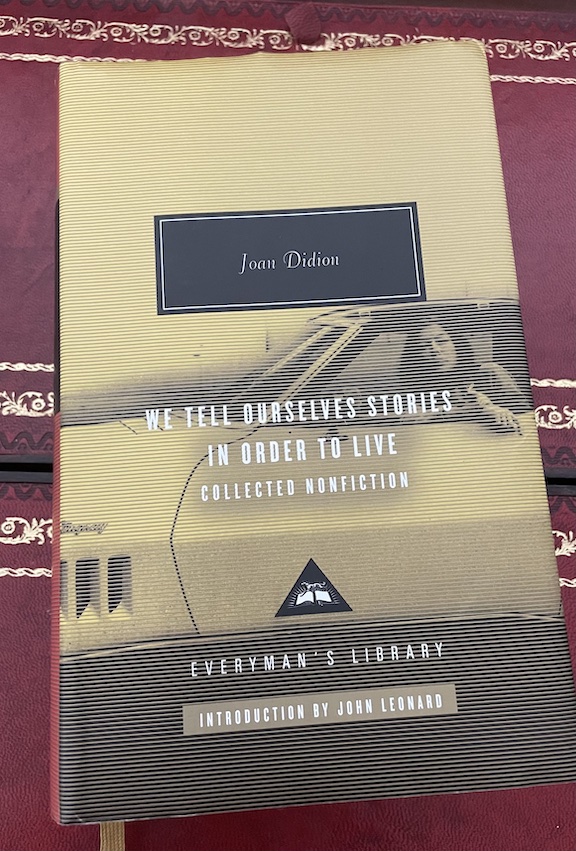Don’t ever believe an academic who claims to be perplexed, never mind thirty-eight of them who sign a letter professing as much.
“We are perplexed…”
Nonsense. Passive-aggressive nonsense.
When an academic professes to be “perplexed” by something happening in academe, they’re not really saying that they are puzzled or confused or at a loss to understand something. What they’re saying, in fact, is quite the opposite: someone else is confused and lacking in understanding, someone else has muddied things up. For of course no self-regarding scholar would confess to be perplexed by what is reasonable or sensible or clear. To claim perplexity is to say, in effect, “I am being perfectly reasonable; you, on the other hand, are not.”
Joan Didion had a name for this kind of rhetoric: “little silken whips of innuendo.”
 This perfect descriptor—did she ever write one that wasn’t?—comes in her essay “The West Wing of Oz,” from Political Fictions, and anthologized in We Tell Ourselves Stories in Order to Live.
This perfect descriptor—did she ever write one that wasn’t?—comes in her essay “The West Wing of Oz,” from Political Fictions, and anthologized in We Tell Ourselves Stories in Order to Live.
Didion was sharply attuned to how language conveys meaning. Over and over in her essays she foregrounded Discourse, when “what was said” (a favorite framing for Didion: “It was said…”) had an agency of its own, independent of the particular person doing the saying, when ways of wording things both revealed and shaped ways of seeing things.
In this essay, Didion discussed (among other things) the Reagan Administration’s obfuscation of the El Mozote massacre in El Salvador in order to continue to secure Congressional funding for the U.S.-backed counterinsurgency efforts of the Salvadoran regime. Here’s what Didion wrote:
The Mozote case was, [Elliott] Abrams said, “a very interesting one in a sense.” “Interesting” was at the time a word much in use, as were “strange” and “unusual.” [Thomas O.] Enders, for example, had noted that Socorro Juridico “strangely lists no victims of guerrilla and terrorist violence.” I recall watching Jeane Kirkpatrick during this period tease an audience to frenzy with little silken whips of innuendo as she described how “interested,” even “bemused,” she was by the “unusual standards,” the “extraordinarily, even uniquely demanding standards” imposed by the certification requirement (780).
Little silken whips of innuendo. Polite, dispassionate words ostensibly professing puzzlement at the rationale of others’ decisions or conclusions, but actually intending to convey the opposite: those others are irrational, unreasonable, lacking in sense, lacking in understanding, silly, perhaps dangerous but certainly ridiculous in their behavior. How dare they.
Of course academics have a ready rejoinder to anyone impolite enough to point out this common convention of polite academic discourse: “I am puzzled by this insistence on reading more into my words than I mean.”
You’re not puzzled, professor; you’re pissed.
And I am too.
I’m flat out disgusted by the thirty-eight Harvard professors who signed a letter expressing their puzzlement, their absolute bemusement, that one of their own might have to face some professional consequences for inappropriate behavior towards a grad student, only to backpedal furiously when details that had already been reported in various news outlets were concisely reiterated in a court filing. “Oh, gosh, we didn’t realize the accusers were willing to swear by their accounts of what happened; this changes everything. We take it back, we take it back.”
But I’m not just pissed at the Harvard profs. I’m pissed at the professoriate. I’m pissed at the state of graduate education. I’m pissed at my own professors from graduate school—not all of them, certainly, but a Memorable Pair in some kind of bizarre relationship that required one of them to demean me repeatedly to prove their subservience to the other one. Absolute sadists.
I’m pissed that every cohort of graduate students has to put up with experiencing or witnessing something like that, or something even worse. I’m pissed that there is probably at least one known abuser at every single graduate program in the country, and their colleagues can’t or don’t seem to do anything about it, and their students are just left to fend for themselves. I’m pissed that the only ones who can safely name names are those who are out of academe entirely.
Now out of academe entirely, I’m pissed at myself because I still can’t quite bear to name names. I’m pissed that any of us should have to.
But I’m not “puzzled”; I’m not “perplexed.”
I’m just so damn tired.

0